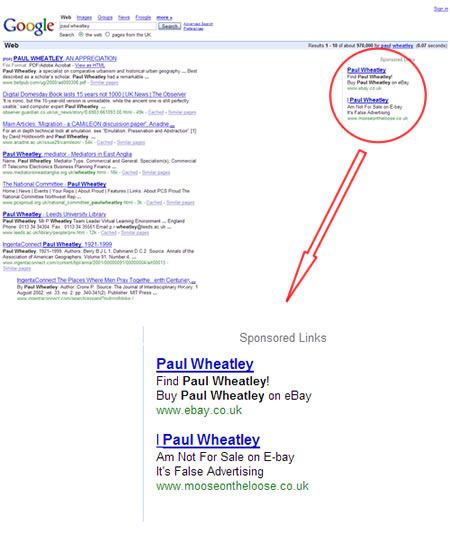We recently conducted this lengthy & tedious task on all networks and noticed a lack of continuity & ambiguity. Where it is ambiguous, we refrain from brand named bidding.
Several points we would like to note & NETWORK XYZ should observe were brought to attention at meetings or discussions with ourselves, was that there are several possible points of reference for a keyword policy, in places these are in confliction with each other. It is the sole responsibility of NETWORK XYZ and/or the account managers to ensure that there is Only a Single Point of Reference for keyword policy for any given merchant. If any changes are made, they MUST all update simultaneously, any changes made, no matter how minute, should automatically send an email to affiliates, notifying them that changes have been made, with the keyword policy contained both within the email and to refer to admin interface. Not all affiliates I am sure refer to the several points to source keyword policy, maybe only one.
What is incredibly infuriating, are when changes are made by account managers whereby affiliates are not suitably notified, this indiscretion is commonplace amongst all networks and happens all too frequently. Even a full stop “.” or a space” ” on restricted or negative keywords can make a significant difference to a campaign. Even more so when blame is deflected to affiliate, when the fault lies with the network who seem just to want to look favourable in the clients eyes. Now, genuine errors can be made by any party, as much as anyone being fallible without intent to circa navigate policies, so there needs to be tolerance & understanding from all those involved. It should never be a “put up & shut up” scenario.
In addition, we know of restricted keyword policies that have not been updated on system, again commonplace across networks.
One of the weakest links, is when there is meant to be restricted keyword policy or it’s inaccurate or incomplete, but more problematic is that the NETWORK XYZ system says refer to merchants FAQ, however a majority of the time this is blank with no details on merchants page to refer to. With regard to some of the points required for a clear & concise keyword policy I will come onto next, but NETWORK XYZ also have to take responsibility too, which we hope will be the outcome of this & the meetings, leaving little room for confusion and harmonious & responsible working relationships.
While no doubt there will be a massive knee jerk reaction and exponential increase in keyword restrictions, networks must be careful they do not become too paranoid that this fragments & decimates the affiliate market industry for the worse, whilst there is too much focus on keyword policy than useful content for the affiliate to use. Another point of paramount important is a single point of reference of a keyword policy, whereby it is imperative the policies are not scattered around various tabs & worse still inconsistent. It is the directive of a network to ensure a “single point of reference” and with any changes however minute that an email notification is both sent out & included within any internal email. However, I am inclined to feel this may not overall happen correctly.
Food for thought, what is the difference between bidding on a brand via SEM or appearing for brand on SEO, whty is the formeer being crucified.
—————————————
Amalgamation of Suggestions
—————————————
Here is a brief summary of what we expect to see as part of concise keyword policies, in conjunction with above
a) Can an affiliate send traffic directly to the merchants website from ppc search engines – Using their url as the display url? Also which PPC Search Engines does this apply to, since only Google has a single URL restriction policy.
b) Can an affiliate bid on the merchants brand name? e.g. Dell
c) Can an affiliate bid on Hybrid Phrase = merchant brand name + generic term (e.g. Dell Computer, etc.)? e.g. “Dell” being the brand & “Computer” being the Generic. When conjoined forms the Hybrid “Dell Computer”
Please note: that other competitor ads will probably appear for those bidding on the generic term aspect of the hybrid phrase in a broadmatch. Does the merchant want to lose out on this potential ad coverage to MULTIPLE competitors, who affiliates can advertise on behalf of too?
d) If the merchant has restrictions – what EXACT TERMS CAN AN AFFILIATE NOT BID ON – if they don’t include this, the affiliate might induce they have a free reign. Blanket terms of misspellings & variations etc., is NOT ACCEPTABLE! With regard to these terms which the merchant should hold trademarks too, if negative keywords are requested, are they exact match, broadmatch or phrase match? This is important. Also full stops & spaces can make a difference. Is there a maximum bid imposed?
Please note: Has the merchant registered these phrases (trademarks) they “actually” own the marks to with Google? Also the merchant should provide the trademark numbers as proof to affiliates. Does the merchant also own the marks to the hybrid phrases (brand + generic). Granted though providing Trademark numbers may not be pratical, though perhaps it will prove clarification if presented at network level.
e) Can the affiliate bid on Brand terms and /or Hybrids to send traffic through to their own website or a specific landing page designed by the affiliate & approved by the network and/or merchant? If a check is required?
f) Can an affiliate bid on misspellings & variations? However does the merchant actually own the marks to these? Is the merchant over-stepping their boundaries?
g) Can an affiliate bid on generic & targeted product related terms & send directly to the merchants website using their display url?
h) Does the merchant conduct their own in house ppc campaign or is it run by a ppc agency or possibly even the network (if a network, there is then a conflict of interest)?
i) Who is currently giving the merchant the advice about PPC policy? Has the merchant actually consulted affiliates for a balanced presentation? Or have they simply said what some agency ill advised them to do or maybe a network is too polite & meek to mention (A yellow bellied nodding dog in the case of one or two OTHER networks)? Some agencies may impressively provide the bells & whistles with corporate speak, bumpf & power point presentations with colloquial vocabulary, but realistically an affiliate could demonstrate the nuts & bolts of it all in more laymans terms.
j) Does the program have a closed group policy for certain affiliates? Did the network or account manager pick via teachers pet syndrome or was this presented / tendered to a number of affiliates whom may be suitable candidates but were overlooked? If there is a closed group this too should be mentioned, and may prevent some affiliates making assumptions …. Like “If he’s doing it, then I’m doing it”
k) Continuing with whether the merchant actually owns the marks to these misspellings or variations? Have they tried registering these with Google (though they never used to accept these they may now well consider misspellings in certain cases)? This may prevent some problems.
l) Also, to all the above questions, if there is an objection by the merchant or their representative, we would need to know their full reasoning pertaining to that decision so that the merchant can be correctly guided or communicated with directly with “certain other parties” not involved on a case by case basis, however there would be considerable overlap. Formulating a “book of rebuttal” or polite “white paper” to educate merchants about search engine marketing, focusing on how some imposed restrictions could stunt the growth of their program & consequently any positive brand awareness or ROI.
m) Where to every question put forward a merchant we have to ask “IF NOT WHY NOT” to ascertain if their reasoning is well thought out or they were incorrectly influenced or simply knee jerk reactions through ignorance. As we suspect, soem networks get merchants on board by saying they will restrict affiliates as much as possible in the PPC Arena.
n) Perhaps there should be further discussions to the advantages & disadvantages (pros & cons) to each point.
p) Can I use the brand name in the sub domain or directory url of my own domain name? Though the merchant has no right to prohibit me and shouldn’t even come into the discussion. Though stupidly, one particular network has included this a prerequiste option.
q) Can the affiliate use the brand name in the title of an ad, or advert copy?
r) Keyword policies & NETWORK XYZ intended contract needs to be fair and balanced without being too inhibitive to affiliates, which I am sure is NETWORK XYZ intention – not a “put up & shut up” and consequently being left in the cold.
s) But firstly, let’s set out the minimal information & guidelines or rules we require in order to adhere to and ensure from NETWORK XYZ there is 100% communication from them, on both existing policies & future changes, no matter how minute.
u) Notication of changes to any PPC Policy should come under contract law, where a suitable period of grace is given to implement any changes, as it is changes to the terms & conditions of any agreement … these also communicated effectively to affiliates by several methods, not just one telephone, email and/or internal messaging system.
RELATED POSTS
Networks Changing PPC Policy Without Due Notification
http://www.a4uforum.co.uk/showthread.php?t=42750
PPC : Closed Groups for Bidding on Brand
http://www.a4uforum.co.uk/showthread.php?t=40705
Networks Advising Incorrectly on Display URL’s
http://www.a4uforum.co.uk/showthread.php?t=42734


